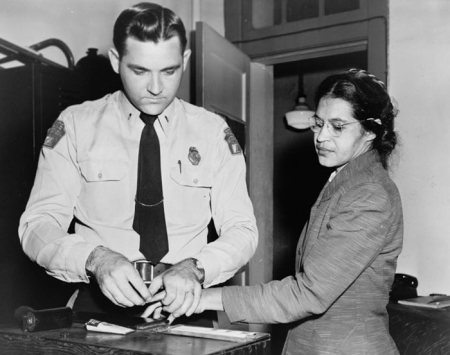From a commenter: “I wish the author had written in a less academic and more conversational tone because it would’ve been more accessible. Parks’ story is very important and needs to be heard by everyone.
From what I’ve read so far, the information seems well-researched and there are some really heartbreaking stories about how blacks were treated in the South and the shaky rise and muddled politics of the NAACP. Rosa comes across as an extremely strong person but I sometimes got the impression that the author was hounding her graduate thesis on us- that Parks WAS a strong woman, not a gentle bystander, ect. She pretty much repeates this argument every single page. I kept thinking to myself, ‘Yeah, I’m NOT arguing with you, there’s no need to be so aggressive with your thesis!’
So, if I had a complaint, it would be that it’s a bit too academic for a nighttime read and the author came across as unnecessarily aggressive. Other than that, the book serves its purpose-it gives Mrs. Parks a voice that has long been unheard.”
“By the time the account of Mrs. Parks’ arrest and the subsequent Montgomery Bus Boycott are recounted, everything starts to feel more familiar, but the experience is richer knowing how Mrs. Parks got to that place. That place where she refused to give up her seat. That place where she made an extraordinary act of personal dignity. We often think of Mrs. Parks as an “older lady” at the time of her arrest, but she was only 42 years old. Granted, that was old enough for her to be considered the “mother figure” to all of the young male organizers. In 1955, Martin Luther King Jr. (the newest and youngest minister in Montgomery) was only 26. It was in this moment when you begin to feel the first splinters in the history-book narrative. The boycott was organized by men, but the women were often on the frontlines of carrying out the day-to-day activities of the boycott. Mrs. Parks lost her job (as a department store seamstress) and then barely any of the money pouring in to support the boycott went to Mrs. Parks. She basically spent the next decade post-arrest living hand-to-mouth.
Mrs. Parks finally got a permanent job with Congressman John Conyers in 1965 and she and her husband moved permanently to Detroit. I came away with an abiding respect for Rep. Conyers for recognizing the need to give Mrs. Parks a permanent job, and for utilizing her strengths as an organizer. She acted, for the most part, as Conyers’ eyes and ears in Detroit. The post-1965 period of her life (she passed away in 2006 and Mrs. Parks is still the only African-American woman to lay in state in the US Capitol) was also rich in advocacy and activist work.” (Cele|bitchy)






